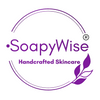What’s Really in Commercial Soaps?
When was the last time you really thought about the soap you use every day? Most of us simply grab whatever is on the shelf without giving it a second thought. But here’s the thing—not all soaps are created equal. Many of the commercial soaps you see in stores aren’t even real soap! They’re made with synthetic detergents, harsh chemicals, and artificial fragrances that can do more harm than good.
This realization hit me hard when I started paying attention to the ingredients in the products I was using. My skin was constantly dry, irritated, and just didn’t feel healthy. That’s when I discovered the world of handcrafted soaps, and honestly, it changed everything.
Here’s the not-so-pretty truth: most commercial soaps are loaded with ingredients you can’t even pronounce. They’re packed with synthetic detergents that create loads of foam but strip your skin of its natural oils. Then there are the artificial fragrances—yes, they smell great, but they’re often made from chemicals that can irritate sensitive skin or cause allergic reactions.
And let’s not forget the preservatives. Parabens and other synthetic compounds are added to extend shelf life, but at what cost? These chemicals are known to disrupt hormones and have been linked to various health concerns. Is that really something you want on your skin every day?
Why Handcrafted Soaps Are Different
Switching to handcrafted soaps felt like a breath of fresh air for my skin. Here’s why these soaps are truly special:
Pure Ingredients: Handcrafted soaps are made with natural oils, butter, and botanicals. These ingredients are not only gentle but also nourishing, leaving your skin soft and healthy.
No Nasty Chemicals: You won’t find synthetic detergents, parabens, or artificial fragrances in these soaps. They’re as close to nature as you can get.
Gentle on Skin: Many handcrafted soaps retain glycerin, a natural by-product of the soap-making process. Glycerin is a powerful moisturizer that commercial soap manufacturers often remove to use in other products.
Eco-Friendly: Handcrafted soaps are often made in small batches with sustainable practices. They’re biodegradable and come in minimal or plastic-free packaging, making them a win for the planet too.
Made with Love: Each bar is crafted with care, often by people who are passionate about creating a better alternative for your skin. There’s a personal touch in every bar that you just can’t get from mass-produced products.
Explore Our white labelling services to launch your own brand of handmade natural soaps with complete customisation and private labelling support.
It’s Time to Make the Switch
Think about it: your skin is your largest organ. It absorbs everything you put on it, so doesn’t it deserve the best? Handcrafted soaps aren’t just a luxury; they’re a healthier choice for your skin and the environment.
When I made the switch, I noticed the difference almost immediately. My skin felt softer, more hydrated, and just… happier. Plus, knowing that I’m supporting small businesses and sustainable practices makes it all the more rewarding.
So, if you’re still using commercial soaps, maybe it’s time to pause and ask yourself: what’s really in the products I’m using? And more importantly, is it time for a change?
Your skin deserves better. Choose natural, choose sustainable, and most importantly, choose handcrafted. Trust me, your skin will thank you for it.
Frequently Asked Questions [FAQs]
1. Why are commercial soaps harmful to my skin?
Commercial soaps often contain harsh detergents like SLS/SLES, parabens, synthetic fragrances, and artificial dyes—ingredients linked to dryness, irritation, and disrupted skin barrier function
2. Do commercial soaps impact the environment negatively?
Yes. Synthetic surfactants and preservatives in commercial soaps pollute waterways, harm aquatic life, contribute to plastic waste, and promote deforestation via palm-oil sourcing
3. What are the benefits of switching to handcrafted soap?
Handmade soaps use natural oils, butters, and botanicals—while preserving glycerin—providing deep hydration, fewer irritants, and lower ecological impact.
4. What harmful chemicals are commonly found in commercial soaps?
Common harmful ingredients include sodium lauryl sulfate (SLS), parabens, phthalates, triclosan, formaldehyde-releasing agents, and synthetic dyes—all linked to irritation, hormonal disruption, and environmental toxicity .
5. Does handcrafted soap retain natural glycerin?
Yes—cold‑processed and handcrafted soaps retain natural glycerin (a humectant), which moisturizes skin. In contrast, commercial soaps often strip away glycerin

